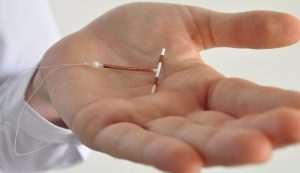 IUDs work against pregnancy in several ways. Some of these effects take place before fertilization, and others take place after the sperm and egg have united to form a new human being.
IUDs work against pregnancy in several ways. Some of these effects take place before fertilization, and others take place after the sperm and egg have united to form a new human being.
Although IUDs are marketed as the most effective form of reversible contraception women who use IUD can become pregnant. Many of those pregnant women continue using the IUD because it is difficult to remove. There is a possibility of miscarriage after IUD removal.
According to a recent article published in the Journal Growth Hormone and IGF research, the copper IUD may affect embryo development.
The authors reported that the study focused on the measurement of the changes in human leucocyte antigen-G (HLA-G) and insulin-like growth factor II (IGF-II) levels in the decidua and villi to explore the effect of a copper IUD on embryonic development. The human leucocyte antigen-G (HLA-G) is a molecule found in trophoblast membranes, reflecting the immune tolerance of the mother to the embryo. Insulin-like growth factor II (IGF-II) is a protein hormone similar to insulin. The protein is an important regulator of early embryonic development, particularly placental development.
A total of 54 samples of decidual and villus tissue (the maternal and fetal portion of the placenta) was collected from pregnant women with IUDs (27 samples) or without IUDs (27 samples). The morphological characteristics and protein expression levels were evaluated.
The authors found that Copper IUDs may reduce IGF-II expression in villus tissue, which could compromise the development of an embryo. They conclude, “Thus, use of an IUD during pregnancy may be risky.” Women need to be informed about the possibility of pregnancy when using IUDs and the negative effects on the development of the fetus.
Intrauterine Devices (IUD/IUS)
This entry was posted
on Tuesday, February 22nd, 2022 at 10:35 pm and is filed under News & Commentary.
You can follow any responses to this entry through the RSS 2.0 feed.
You can skip to the end and leave a response. Pinging is currently not allowed.
Use Copper IUD during pregnancy
Although IUDs are marketed as the most effective form of reversible contraception women who use IUD can become pregnant. Many of those pregnant women continue using the IUD because it is difficult to remove. There is a possibility of miscarriage after IUD removal.
According to a recent article published in the Journal Growth Hormone and IGF research, the copper IUD may affect embryo development.
The authors reported that the study focused on the measurement of the changes in human leucocyte antigen-G (HLA-G) and insulin-like growth factor II (IGF-II) levels in the decidua and villi to explore the effect of a copper IUD on embryonic development. The human leucocyte antigen-G (HLA-G) is a molecule found in trophoblast membranes, reflecting the immune tolerance of the mother to the embryo. Insulin-like growth factor II (IGF-II) is a protein hormone similar to insulin. The protein is an important regulator of early embryonic development, particularly placental development.
A total of 54 samples of decidual and villus tissue (the maternal and fetal portion of the placenta) was collected from pregnant women with IUDs (27 samples) or without IUDs (27 samples). The morphological characteristics and protein expression levels were evaluated.
The authors found that Copper IUDs may reduce IGF-II expression in villus tissue, which could compromise the development of an embryo. They conclude, “Thus, use of an IUD during pregnancy may be risky.” Women need to be informed about the possibility of pregnancy when using IUDs and the negative effects on the development of the fetus.
Intrauterine Devices (IUD/IUS)
This entry was posted on Tuesday, February 22nd, 2022 at 10:35 pm and is filed under News & Commentary. You can follow any responses to this entry through the RSS 2.0 feed. You can skip to the end and leave a response. Pinging is currently not allowed.